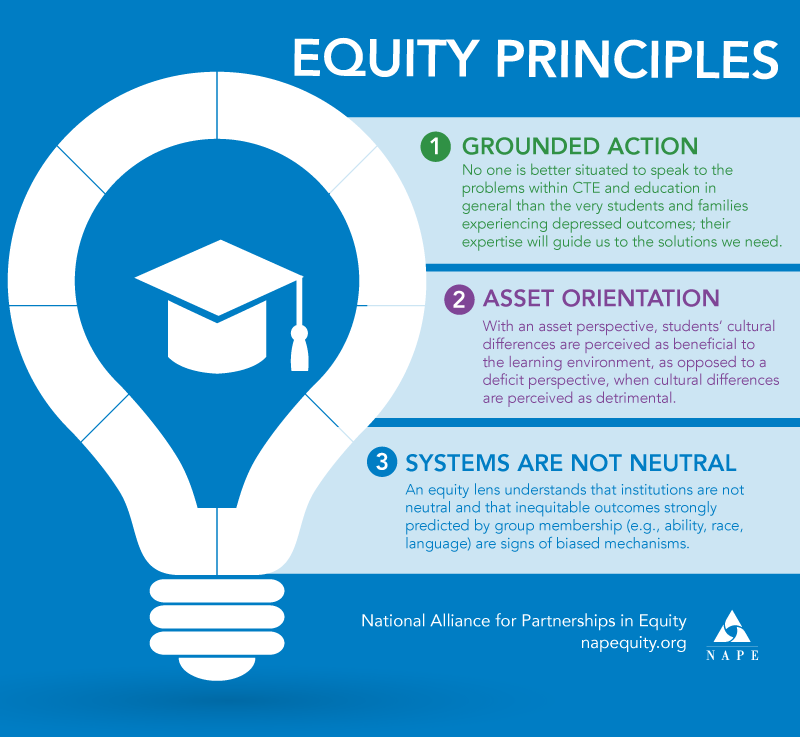Social distancing has afforded me more time at home and the opportunity to reflect on the past year which has been full of transformation and hope personally and professionally. With the reauthorization of the Perkins legislation in 2018, last year I found myself and many others pouring an immense amount of energy into bringing the new legislation to life. Where others’ connection to Perkins V in NAPE started much earlier – thank you Lisa Ransom and the Public Policy Committee – my experience began in earnest by attending the first of three Perkins V meetings hosted by Advance CTE and ACTE in Washington DC in August, 2019.
Over the course of these convenings NAPE and other national organizations focused on CTE had the wonderful opportunity to work alongside state leaders who were working to implement the best state plans possible. That time was crucial as they sorted through the language and intent of the legislation to craft policies and systems that would ultimately frame the CTE experience for a new generation of students.
At stake for us all are the employability prospects for our young people, our neighbors, and the economic prosperity of our states. The economic recovery since the Great Recession of 2008 has not been realized equally by every American. We still find people of color and women overrepresented in low-wage jobs that hold little promise for upward mobility. Connecting marginalized groups and communities with those high-wage and in-demand careers is a critical goal. This is now more evident than ever as unemployment insurance claims have spiked to over 3 million cases. Many of these cases are populated with marginalized individuals who work in service industries.
What became immediately evident through the conversations that began in DC, was that the promise to bring equity to our schools and colleges through the Perkins V legislation was fragile. As with all policy, implementation is where reality meets the best intentions of legislators and advisors.
Chief among the levers within Perkins V to bring equity to the forefront is the requirement for Local Education Agencies to conduct a Comprehensive Local Needs Assessment (CLNA) every two years as part of their local application. The CLNA is a continuous improvement planning process that seeks to uncover the local dynamics within institutions. The CLNA process seeks to account for the persistent equity gaps within our schools by using data, charting the outcomes for students across key groups, and then utilizing root cause research to understand the barriers leading to differential outcomes.
The promise this process holds for educators and leaders is immense. Over 10 years and across many institutions, NAPE has guided secondary and post-secondary groups through our Program Improvement Process for Equity™ (PIPE™) and helped them to bring meaningful change to their programs and pathways. We’ve witnessed how both simple and complex changes alike, implemented thoughtfully by caring teachers and faculty have resulted in diminished gaps, and connected students with careers that can change their financial futures.
The many positive outcomes resulting from PIPE are reason enough to be excited for the new CLNA. And yet, as with most legislation, the power is in the details of an effective implementation. We all have the option to make the CLNA a priority and increase our capacity to do this work, or to limit its scope and place this process on automatic.

To further expand the power of the CLNA process, NAPE developed and now offers the “Equity Principles in the Perkins V CLNA”. In this document, we draw on our experience with PIPE and guiding equity work to offer three important principles. These ideas first serve to reset our vantage point so that we can enter into this work from asset orientation and in community with the organizations and students we serve. Secondly, it’s our hope that these principles equip you to expand your squad and bring others into the equity fold so that this important work gathers steam.
We have no doubt that the planning and implementation of this new legislation will be difficult. NAPE is here to support and encourage you as your teams draw from new skills and ways of being that haven’t been accentuated before. By committing yourself to employing these equity principles, you will be joining a movement of educators across the country in transforming our systems and structures into pathways of success for the students we are all here to serve.
References
Escobari, Marcela, Ian Seyal, and Michael Meaney. “Realism About Reskilling: Upgrading the Career Prospects of America’s Low-Wage Workers.” Brookings, December 2019.
U.S. Department of Labor. “News Release”. March 26, 2020.